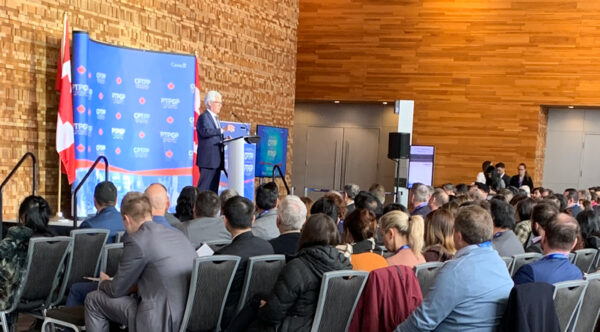Expanding Your Business Horizons: What is the CPTPP international trade deal? | Event Takeaways

Did you know that a newly-launched trade deal with the Asia-Pacific region, will allow Canadian exporters access to almost 500 million consumers in 11 countries?
Notebook in hand, on February 11, I set out to get to the bottom of this new agreement and how it will benefit women business owners at a seminar called Expanding Your Business Horizons: Comprehensive and Progressive Agreement for Trans-Pacific Partnership (CPTPP).
Presented by Global Affairs Canada, in partnership with the Asia Pacific Foundation of Canada, the event hosted trade experts, who explained the CPTPP and its impacts, an open house with the Trade Commissioner Service, plus BC-based entrepreneurs who shared their stories of successfully tapping into the global market.
Here’s what you need to know:
What is the CPTPP?
The Comprehensive and Progressive Agreement for Trans-Pacific Partnership (CPTPP) is a free trade agreement between Canada and Australia, Brunei, Chile, Japan, Malaysia, Mexico, New Zealand, Peru, Singapore and Vietnam.
How it might benefit you
- Tariff elimination: Once fully implemented, 99% of tariff lines among the CPTPP countries will be duty-free. You can find out if your business benefits from tariff reduction or elimination using the free Canada Tariff Finder tool.
- More opportunities: The Asia-Pacific region economy is growing rapidly. Access to Japan, the third largest economy in the world, and growing markets such as Malaysia and Vietnam will provide more opportunities for Canadian businesses.
- Benefits to a broad range of sectors: The trade agreement will help several business sectors including agriculture, seafood, minerals, forestry and financial services.
- Expanded access to government procurement: Governments are usually one of the biggest buyers of goods and services. Canadian businesses will now have guaranteed access to government procurement opportunities, such as construction services contracts procured by the Department of Infrastructure in Australia. The agreement provides rules on non-discrimination and transparency in the procurement process.
- Simplified procedures for temporary entry: This will facilitate the growth of trade in goods, services and investment. Rules for work permits have also been made easier.
Where you can learn more
- The Government of Canada has created a website to explain the CPTPP trade agreement and check out the benefits based on your business sector.
- The Canadian Trade Commissioner Service is an excellent resource for Canadian SMEs who plan to export.
- If you’re looking for financing for your new export market, CanExport can help.
- Business Women in International Trade is a great resource for women-owned businesses that are looking for support while breaking into the global marketplace.
Get in touch with me! I am a FITT-trained professional and I can help to answer your international trade questions. Email me at inquiry@we-bc.ca.




